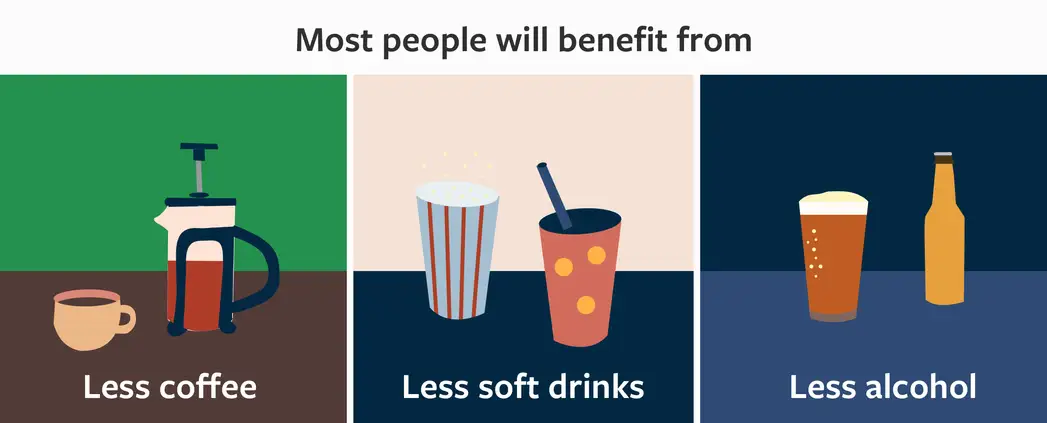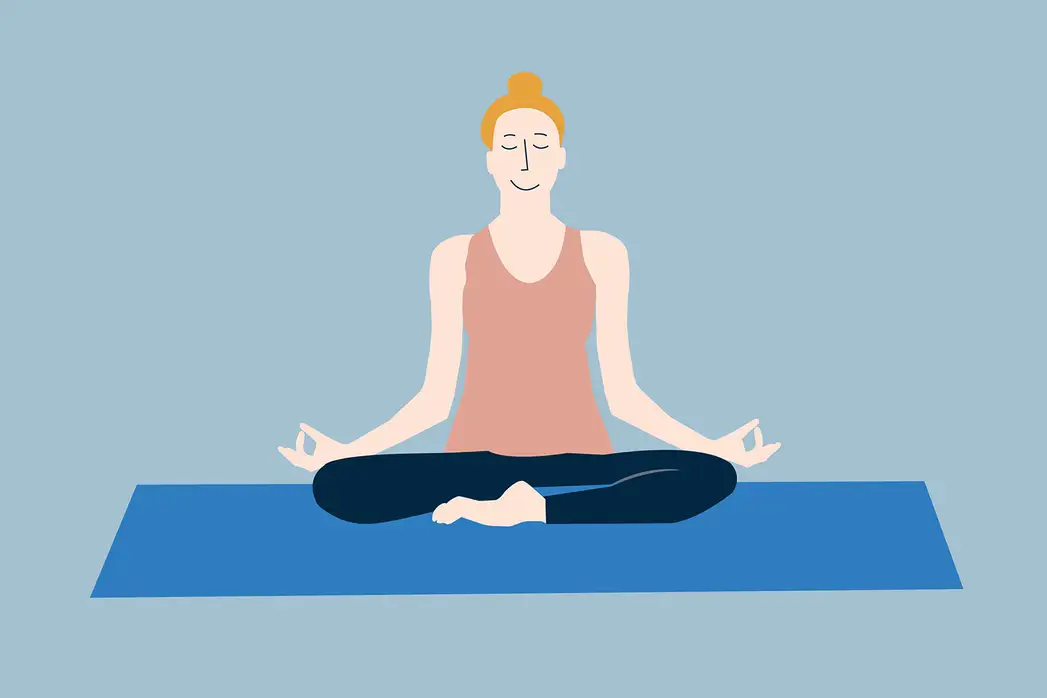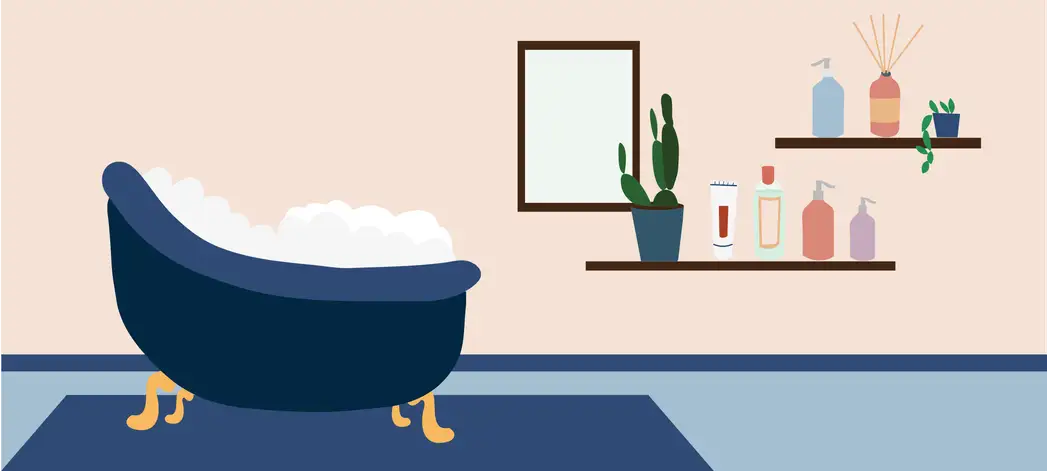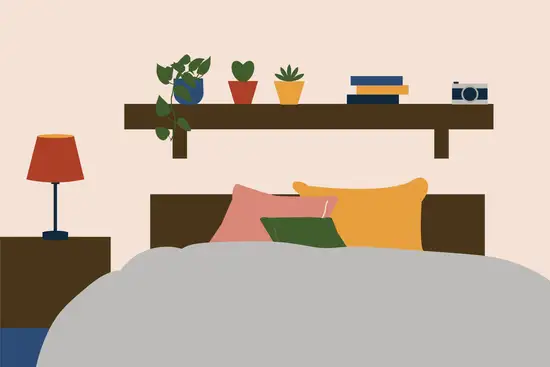Key points
Sleep loves routine and following the same simple steps each night before bed can be an easy and stress-relieving way to prepare your body and mind for sleep. In this article, we’re going to share with you:
- why winding down before bed can help you get a better night’s sleep
- what may be negatively affecting your sleep in the run-up to bedtime
- evening activities that are proven to promote good sleep
- how to craft your perfect wind-down routine
- next steps if winding down isn’t enough to resolve your sleep issue.
Struggling to wind down?
If you find you’re unable to fall asleep night after night, this may be a symptom of insomnia. If you’ve tried everything and still aren’t getting results, why not try our clinically validated sleep improvement course and get your sleep back on track.
Better habits for better sleep
Your brain and body thrive on routine. Whether you realise it or not, you’re probably already following a rough daytime routine. Think about it: maybe you get up, have breakfast, go to work and come home… that in itself is a routine.
But what does your evening routine look like?
If your evening activities are varied and each night is different then you probably don’t have much of an evening routine. This is fine if you still manage to sleep well, but if you’re finding it difficult to switch off and sleep at night, a wind-down routine might be just what you need.
Our modern lives can be busy and stressful and our days are often filled with activity. For many of us, our daytime activities can spill over into our evening time and we can end up not putting aside enough time to relax and unwind before bed.
It’s all about finding a balance. Your daytime hours full of activity are counterbalanced by your sleep time. This is when your mind and body relax and recover from the day. And we’re not just talking about physical activity either.
Whether you spend your daytime run off your feet or sit working in front of a computer, you’re still going to need some downtime to rest and recoup. Sleep is incredibly important for maintaining both your mental and physical health.
Your aching muscles feel better after a good night’s rest and the same can be said for your emotional wellbeing too. This is your brain’s chance to process everything you’ve experienced and felt during the day.
So after a night of blissful sleep, you should wake up emotionally as well as physically refreshed. But how do you make the jump from a daytime full of activity to a relaxed and calm nighttime? The key is to put your day to bed before you go to bed.
A good wind-down routine can effectively act as the bridge between your active daytime and your relaxed and restorative sleep time.
If you’re spending your daytime being active and busy, then before you go to sleep you need to give yourself time to decompress and wind down from everything you’ve experienced during the day.
An evening wind-down routine is an incredibly simple and highly effective way to prepare yourself for sleep. So let’s get straight into how to create a wind-down routine that’s perfect for you.
Building your wind-down routine
Your wind-down routine can be as simple or as complex as you want. You may already be following a bedtime routine, for example: brushing your teeth, changing into nightclothes, getting into bed. Add some relaxing activity in and this becomes a wind-down routine.
It really doesn’t have to have many steps, the key is that it’s easy to repeat.
It’s the repetition that will cement it in your brain as the sequence that comes before sleep. So if every night for a week you follow relax-teeth-pjs-bed then your brain will start to make the connection between this chain of events and the fact that sleep should come next.
Following so far?
In addition to what you should include in your wind-down routine, there’re a few things that you want to avoid or limit in the run-up to sleep. We’ll first take a look at what might be sabotaging your wind-down without you even realising.
Then we’ll explore some relaxing activities that can help you get ready for a night of blissful sleep. Here are six key areas to think about when planning your wind-down routine.
1. Put your work day to bed before you go to bed
For some people packing up and leaving the office for the day is enough to physically disconnect from work. For many people though, this won’t be the case.
Especially with many of us continuing to work from home, it can be hard to switch off from a busy day when work life and home life occupy the same space.
It can be very easy to spend some of your non-work time thinking about the work day’s ups and downs, as well as what tomorrow might bring. This can lead to a state of psychological arousal which can affect the quality of your sleep.1
One way to reduce the impact that thinking about work has on your sleep is to set some time aside, either at the end of the work day or in the evening to plan for the following day or week, depending on what works for you.
While everything is fresh in your mind, make a plan for the coming day: create a to-do list of tasks for the following day, note down things you don’t want to forget, check the weather forecast and plan your outfit for work tomorrow…
Do whatever it is that will help you to get work off your mind at the end of the day. While work can be an important chunk of your day, you also deserve and need some you-time too. So put thoughts of work to bed and then focus on yourself and your post-work relax time.
Planning ahead may not be as direct as other methods of improving sleep, such as altering your caffeine or alcohol intake or adapting your sleep environment, but it has been shown to boost your sleep quality along with feelings of wellbeing and vitality upon waking.1 2

2. Think about what you eat and drink at night
A nice hot drink, some cheeky snacks or a little evening nightcap may be how you choose to relax before bed. This is all fine if you’re sleeping well, but if your sleep isn’t great, it might be time for a rethink of your evening diet.
Caffeine
Caffeine stimulates your brain and increases alertness. While this may be what you enjoy during the day, it’s not going to help when you’re trying to wind down at night. We’re not saying you need to stop drinking anything caffeinated, just consider when you’re having it.
We all have our own tolerance to caffeine so you may or may not find that it affects your sleep. For instance, for a habitual coffee drinker, having a coffee before bedtime won’t cause as much sleep disruption as it would to someone who drinks coffee rarely, if ever.
With that said, for most people it seems that reducing caffeine intake sometime between three and seven hours before bed should lead to fewer sleep problems.3
Caffeine can also be found in places we don’t suspect. An evening hot chocolate, chocolate bar or energy drink too close to bedtime may have an effect on sleep due to their caffeine content.
Sugar
With energy drinks in particular, the combination of caffeine and high sugar content may be even worse for your sleep. Research has shown a link between high sugar intake and more frequent arousals from sleep during the night.
So if sugary drinks or sweet snacks are your weakness, you might want to consider whether you can reduce your intake of these too in the run up to bedtime.4 5
What about alcohol?
Alcohol is both a stimulant and a sedative.6 At low doses, alcohol can help you fall quickly into a deep sleep, but this is balanced by more waking events during the night and lighter sleep as the alcohol is metabolised. This means that overall, alcohol consumption usually harms sleep.
For a heavier drinker, these effects aren’t as marked and in fact, reducing alcohol intake for these people can worsen sleep quality.3
So, while it’s probably better to reduce your alcohol intake, this will vary according to your individual circumstance. If you drink a lot, and find reducing alcohol intake causes worse sleep for you, it might be worth seeking specialist help.

Don’t forget your evening meal
Eating a big or heavy meal too close to bedtime can lead to disturbed sleep. If you like a large evening meal but you’re having trouble sleeping you could try eating a little earlier in the evening. This gives your body a little more time to digest your food before you go to bed.
If you regularly experience heartburn or indigestion in bed, this can also be a sign that you’re eating too close to bedtime. Certain foods, like those with a high fat content, can take longer to digest than others, so it’s worth choosing healthier options in the evening.
The same goes for evening snacking. Lots of us will enjoy a late night snack, but you might just find that dropping the snack or opting for a lighter evening meal can help you fall asleep faster at night.
3. Get smart with your phone
With our growing reliance on connected devices such as smartphones, laptops and tablets, the average time spent on these devices appears to be increasing and most people’s screen time will account for hours of their day.
The timing of when you use your devices has the potential to affect your sleep. For many of us, our evenings will involve some screen time, whether it’s watching TV, doing your online shopping, playing games, or just scrolling through your phone.
While it can be relaxing to unwind with Netflix or catch up on social media, the type of light that these screens emit can lead to a drop in the body’s production of sleep hormones, such as melatonin, especially when these devices are used shortly before bed.7
It’s a good move to stop using electronic devices altogether at least two hours before bed to increase your chances of falling asleep. Instead opt for screen-free activities such as reading, taking a bath, doing a puzzle or anything else you enjoy that doesn’t involve a screen.
This may not be easy or even possible for many of us, so if it’s too much to commit to right away, you might consider the following:
- installing blue light filters on the devices you typically use. These will reduce the amount of blue light that a screen emits over the course of the day.
- Opt for more passive entertainment. Instead of using active and screen-based entertainment like browsing the web, more passive entertainment such as listening to the radio can minimise psychological arousal.
4. Consider some exercise
We all know that exercise is great for boosting your mental and physical health, but it can also contribute to better sleep. Exercising can help to clear your mind after a busy day and can help to reduce levels of stress, anxiety and depression.8 9
It also aids you to build up a sleep debt, helping you to feel tired by bedtime. So with all these benefits, exercise is definitely something you should explore if you want to unwind before bed. But when’s the best time to exercise?
Results from studies are mixed, but bouts of exercise lasting more than an hour around 4-8 hours before your bedtime appear to give the best sleep improvements.3 But this doesn’t necessarily mean exercising in the evening before bed won’t help you sleep.
As long as you give yourself time to cool down and relax after your workout and before you go to bed, then evening exercise can be beneficial to you.
Many different types of exercise have been shown to be effective at improving sleep, but the form of exercise isn’t as important as simply doing some, so pick something you enjoy!10

5. Find your way to relax
A good wind-down routine needs to include something that you personally find relaxing. Whether it’s taking a long bath or shower, reading a book or listening to music, as long as it helps you to mentally unwind, it’s worth including.
Here’re a few tried and tested ways to relax and de-stress:
Meditation and yoga
For some people, practices such as mindfulness, yoga and meditation help them to decompress at the end of the day. Research studies have also shown that all of these can lead to better quality sleep.3 11 12
Take a warm bath or shower
A nice bath or shower can be an excellent way to soothe aching muscles, wash away the stresses and strains of the day and relax before bed. Your bath or shower also has the added benefit of lowering your body temperature in preparation for sleep.
This might sound confusing, because how can warm water make you cooler? It’s actually more about when you get out of the water. The heat of your shower or bath dilates your blood vessels and once you get out, this helps your body to lose heat.
And why does losing heat help you sleep? For optimal sleep, your body temperature actually needs to drop by around 1°C. Getting out of your lovely warm bath or shower mimics this drop and prepares both your body and mind for sleep.
Enjoy some screen-free activities
Reading a book, journaling, doing a jigsaw or filling in a crossword are all activities that can help you relax and don’t involve you looking at a screen.
Listening to music can also help you to relax, and plenty research studies have shown that listening to music can help you sleep.13 It really doesn’t matter what type of music you choose, as long as you like it. So if rock makes you relax, so be it!
Everyone is different, so be sure to make time for the things that you find relaxing as part of your wind-down routine. For you it could be knitting, reading, tinkering in your garage, doing a crossword, or baking a cake.
There’re no rules to what you can choose. Relaxation is personal. Even though there may not be any scientific evidence for its effect, that doesn’t mean that what you find relaxing won’t help you sleep.
Find the scent of sleep
Many people turn to aromatherapy to help boost their mood, regain focus, or help them de-stress. Using scent is a traditional sleep aid and lavender is one of the most popular aromas to help you drift off.
Exposure to relaxing scents may improve sleep.14 Try using a lavender infused pillow spray, burn a scented candle or place a reed or electric diffuser in your room to help aid relaxation.
If lavender isn’t your scent, don’t worry, there’re many essential oils that are thought to help with sleep (even if the scientific data is lacking). Scents like chamomile and neroli are two others to consider, but any scent that makes you feel relaxed will work.
Just make sure you follow the same routine with your chosen scent each night to allow your brain to make the link between the calming scent and bedtime approaching.

6. Make your bedroom your sleep sanctuary
Your wind-down routine ends with you going to bed and so your bedroom should be quiet, dark, and cosy. If you’re trying to sleep in a room that’s not well set up, then all the effort you put into your wind-down might be for nothing.
For example, if you walk into your room and it’s untidy, you might feel annoyed by the mess and this can make it harder to fall asleep. Or maybe your room instantly stresses you out because you know that you’re going to be woken at dawn by noisy pigeons outside your window.
Your sleep space should be inviting and add to the feelings of calm your wind-down routine has given you. Making changes to your sleep environment can have a huge influence on how well you sleep, so now might also be time to consider if there’re any simple changes you could make to create your ideal bedroom setup.
You can incorporate your bedroom into your evening routine too. Simple tasks like closing the curtains, lighting a scented candle or turning down your bed can become part of your wind-down routine if you want to include them.
Putting together your wind-down routine
Hopefully you now know what you want to include and what you should limit when it comes to your evening wind-down time. So let’s talk about how to get your routine in place.
When should your wind-down start?
This depends on you. If you’re planning to follow a long wind-down routine then you’ll want to start it earlier in the evening. If you want a shorter routine, you’ll need less time. So aim for somewhere between half an hour and a couple of hours before you want to sleep.
Your aim is to give yourself enough time to relax and unwind before you hit the hay.
Keep it consistent
We say this a lot, but sleep loves routine. So start by setting a bedtime and try to keep to it each night of the week. Keep your wind-down activities consistent and follow the same order each night.
Keep it consistent and your brain will soon start building an association between the steps in your wind-down routine and the fact that sleep comes afterwards. If you miss a night for whatever reason, don’t worry.
Your wind-down routine is there to help you relax, but you’re not a robot. Life isn’t always the same, day-in, day-out. Research shows that missing a day won’t reduce the chance of forming a new habit.15 Pick up your routine the next possible night.

Give it time
A wind-down routine is a great way to prepare for sleep, but the effects won’t be immediate. So don’t stress if you’re not seeing results straight away. Research shows it can take our brains an average of around two months to learn a new habit, so stick with it!15
If you’re not seeing any changes to your sleep and your motivation is dipping, just keep in mind all of the benefits you stand to see once your routine is established:
- winding down at night can reduce feelings of stress and anxiety
- lowering levels of stress and anxiety leads to better sleep
- when you sleep better, you wake up feeling refreshed
- good sleep improves your overall health and wellbeing.
If you’ve established a good wind-down routine but you’re still not getting the sleep you need then there’re likely other factors at play. You could be experiencing a sleep disorder and a little extra help could be just what you need to get back to sleeping well.
This is where Sleepstation excels. We’ve helped many thousands of people just like you to fix their sleep. Our sleep improvement course was created by leading sleep experts. It’s backed by decades of solid science and is highly effective.
So how does it work? We’ll begin by helping you to identify what’s disrupting your sleep and then we’ll create your personalised sleep plan to get your sleep back on track.
Over the course, you’ll learn how to overcome any obstacles standing between you and the sleep you deserve. You’ll be supported throughout by your sleep coaches, who’ll be on hand to guide and reassure you at every step.
A good wind-down routine is just one part of developing good sleep habits and our course builds on this and other areas of sleep hygiene to empower you to rebuild your sleep on a strong and healthy foundation.
You’ll learn so much about your own sleep, at your own speed and from the comfort of your home. With access to all of our videos and resources, you’ll have all the tools and knowledge to confidently take back control of your sleep for good.
Want to learn more? Take our short sleep quiz now and see how we can help you get back to sleeping well, night after night.
Summary
Following a wind-down routine can help you to relax and unwind before you go to bed and can lead to improved sleep. We’ve covered:
- how you need to put your workday to bed before you go to bed
- what evening habits you might want to reduce in the run-up to bedtime
- proven ways to relax and unwind in the evening
- the benefits of a consistent wind-down routine for your sleep and your overall health and wellbeing
- how Sleepstation can help you build good sleep habits beyond a wind-down routine and guide you back to the sleep you deserve.
References
- Fritz C, Crain T. Recovery from work and employee sleep: Understanding the role of experiences and activities outside of work. In: Barling J, Barnes CM, Carleton EL, Wagner &. DT (eds). Work and sleep: Research insights for the workplace. Oxford University Press, 2016, pp 55–76. ↩︎
- Casper A, Sonnentag S. Feeling exhausted or vigorous in anticipation of high workload? The role of worry and planning during the evening. J Occup Organ Psychol 2020; 93: 215–242. ↩︎
- Irish LA, Kline CE, Gunn HE, Buysse DJ, Hall MH. The role of sleep hygiene in promoting public health: A review of empirical evidence. Sleep Med Rev 2015; 22: 23–36. ↩︎
- Aric A, Prather CW, Leung NE, Adler L, Ritchie B, Laraia ES. Short and sweet: Associations between self-reported sleep duration and sugar-sweetened beverage consumption among adults in the United States. Sleep Health 2016; 2: 272–276. ↩︎
- St-Onge M-P, Roberts A, Shechter A, Choudhury AR. Fiber and saturated fat are associated with sleep arousals and slow wave sleep. J Clin Sleep Med 2016; 12: 19–24. ↩︎
- Hendler RA, Ramchandani VA, Gilman J, Hommer DW. Stimulant and sedative effects of alcohol. Curr Top Behav Neurosci 2013; 13: 489–509. ↩︎
- Zhao X, Feng X, Garg R, Kelly KM. Reducing late evening bedtime electronic device intentions and use among young adults. Sleep Health 2019; 5: 401–408. ↩︎
- Anderson E, Shivakumar G. Effects of exercise and physical activity on anxiety. Front Psychiatry 2013; 4: 27. ↩︎
- Sharma A, Madaan V, Petty FD. Exercise for mental health. Prim Care Companion J Clin Psychiatry 2006; 8: 106. ↩︎
- Sullivan Bisson AN, Robinson SA, Lachman ME. Walk to a better night of sleep: testing the relationship between physical activity and sleep. Sleep Health 2019; 5: 487–494.
↩︎ - Howell AJ, Digdon NL, Buro K, Sheptycki AR. Relations among mindfulness, well-being, and sleep. Pers Individ Dif 2008; 45: 773–777. ↩︎
- Baklouti S, Fekih-Romdhane F, Guelmami N, Bonsaksen T, Baklouti H, Aloui A et al. The effect of web-based Hatha yoga on psychological distress and sleep quality in older adults: A randomized controlled trial. Complement Ther Clin Pract 2023; 50: 101715. ↩︎
- Dickson GT, Schubert E. How does music aid sleep? literature review. Sleep Med 2019; 63: 142–150.
↩︎ - Fismer KL, Pilkington K. Lavender and sleep: A systematic review of the evidence. Eur J Integr Med 2012; 4: e436–e447. ↩︎
- Lally P, van Jaarsveld CHM, Potts HWW, Wardle J. How are habits formed: Modelling habit formation in the real world. Eur J Soc Psychol 2010; 40: 998–1009. ↩︎


